
The Union Pacific Railroad, legally Union Pacific Railroad Company and often called simply Union Pacific, is a freight-hauling railroad that operates 8,300 locomotives over 32,200 miles (51,800 km) routes in 23 U.S. states west of Chicago and New Orleans. Union Pacific is the second largest railroad in the United States after BNSF, with which it shares a duopoly on transcontinental freight rail lines in the Western, Midwestern and Southern United States.

Philip Danforth Armour Sr. was an American meatpacking industrialist who founded the Chicago-based firm of Armour & Company. Born on an upstate New York farm, he made $8,000 in the California gold rush, 1852–56. He opened a wholesale soap business in Cincinnati, then moved it to Milwaukee. He made millions selling meat to the United States Army during the Civil War. In 1875, he moved his base to Chicago. Armour's innovations including bringing live hogs to the metropolis for slaughter, inventing an assembly line system for the dis-assembly of hogs, canning the product, economy of scale and efficiency in detail. He systematically utilized waste products, boasting that he made use of "everything but the squeal". The introduction of refrigerated rail cars opened a national market for him and competitors such as Gustavus Swift. Armour expanded into banking and speculation on the futures market for pork and wheat by 1900, his plants employed 15,000 workers; his own wealth was in the range of $50 million. The urgent Army need for meat during the Spanish–American War of 1898 led to highly publicized complaints about "embalmed beef." Armour retired from business in 1899, and devoted himself to philanthropy in the Chicago area, including low-cost housing for industrial workers, and the major institution of higher education, the Armour Institute of Technology.

In railroad terminology, a stock car, cattle car, cattle truck or cattle wagon is a type of rolling stock used for carrying livestock to market. A traditional stock car resembles a boxcar with louvered instead of solid car sides for the purpose of providing ventilation; stock cars can be single-level for large animals such as cattle or horses, or they can have two or three levels for smaller animals such as sheep, pigs, and poultry. Specialized types of stock cars have been built to haul live fish and shellfish and circus animals such as camels and elephants. Until the 1880s, when the Mather Stock Car Company and others introduced "more humane" stock cars, death rates could be quite high as the animals were hauled over long distances. Improved technology and faster shipping times have greatly reduced deaths.
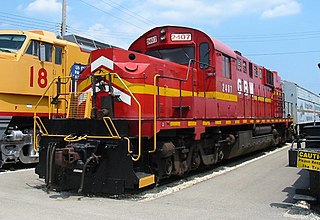
The Green Bay and Western Railroad served central Wisconsin for almost 100 years before it was absorbed into the Wisconsin Central in 1993. For much of its history the railroad was also known as the Green Bay Route. At the end of 1970 it operated 255 miles of road on 322 miles of track; that year it reported 317 million ton-miles of revenue freight.
Frigidaire Appliance Company is the American consumer and commercial home appliances brand subsidiary of multinational company Electrolux.
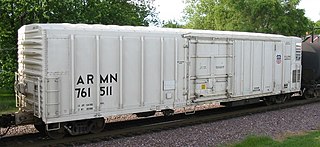
A refrigerator car is a refrigerated boxcar (U.S.), a piece of railroad rolling stock designed to carry perishable freight at specific temperatures. Refrigerator cars differ from simple insulated boxcars and ventilated boxcars, neither of which are fitted with cooling apparatus. Reefers can be ice-cooled, come equipped with any one of a variety of mechanical refrigeration systems, or utilize carbon dioxide as a cooling agent. Milk cars may or may not include a cooling system, but are equipped with high-speed trucks and other modifications that allow them to travel with passenger trains.

Gustavus Franklin Swift, Sr. was an American business executive. He founded a meat-packing empire in the Midwest during the late 19th century, over which he presided until his death. He is credited with the development of the first practical ice-cooled railroad car, which allowed his company to ship dressed meats to all parts of the country and abroad, ushering in the "era of cheap beef." Swift pioneered the use of animal by-products for the manufacture of soap, glue, fertilizer, various types of sundries, and even medical products.
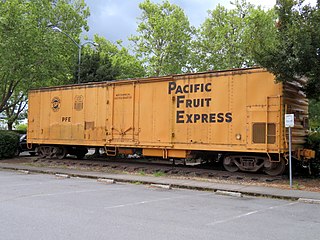
Pacific Fruit Express was an American railroad refrigerator car leasing company that at one point was the largest refrigerator car operator in the world.
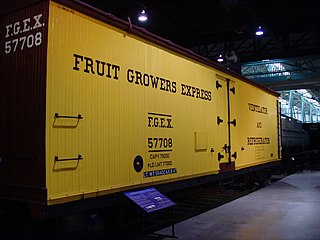
Fruit Growers Express (FGE) was a railroad refrigerator car leasing company that began as a produce-hauling subsidiary of Armour and Company's private refrigerator car line. Armour controlled both the packing operations and the transport insulated railroad car line, and its customers had complained they were overcharged. In 1919 the Federal Trade Commission ordered the company's spinoff of Fruit Growers Express for antitrust reasons, which was accomplished by 1920.

The Santa Fe Refrigerator Despatch was a railroad refrigerator car line established as a subsidiary of the Atchison, Topeka and Santa Fe Railway in 1884 to carry perishable commodities. Though the line started out with a mere 25 ventilated fruit cars and 8 ice-cooled refrigerator cars, by 1910 its roster had swollen to 6,055 total units.
Burlington Refrigerator Express (BREX) was a railroad refrigerator car leasing company that was formed on May 1, 1926 as a joint venture between the Chicago, Burlington and Quincy Railroad (CB&Q) and the Fruit Growers Express Company. The move helped the FGE expand its business into the Pacific Northwest, and added almost 2,700 ice bunker units to the existing car pool already under lease by the Burlington to the FGE and Western Fruit Express (WFE).

Western Fruit Express (WFE) was a railroad refrigerator car leasing company formed by the Fruit Growers Express and the Great Northern Railway on July 18, 1923 in order to compete with the Pacific Fruit Express and Santa Fe Refrigerator Despatch in the Western United States. The arrangement added 3,000 cars to the FGE's existing equipment pool. It is now a wholly owned subsidiary of the Burlington Northern Santa Fe Corporation (BNSF), the Great Northern's successor. The success of the WFE led to the creation of the Burlington Refrigerator Express (BREX) in May 1926.
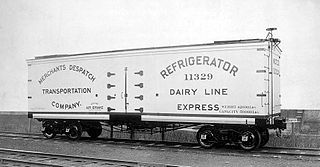
The Merchants Despatch Transportation Company was established in 1857 or 1858 by the American Express Company of New York. The entity was reformed as a joint stock trading company on June 1, 1869, with ownership divided among the Cleveland, Columbus, Cincinnati and Indianapolis Railway (CCC&I), the Lake Shore and Michigan Southern Railway, and the New York Central Railroad (NYC), all part of the Cornelius Vanderbilt rail empire.

The Swift Refrigerator Line was a private refrigerator car line established around 1875 by Chicago meat packer Gustavus Swift, the founder of Swift and Company.

Two distinct and separate railroad refrigerator car companies have operated under the name Western Refrigerator Line.

The St. Louis Refrigerator Car Company (SLRX) was a private refrigerator car line established on February 3, 1878, by Anheuser-Busch, the brewer's first subsidiary. SLRX was formed to facilitate large-scale distribution of the A-B's products via the U.S. rail network. The SLRX not only built its own bunkerless reefers, but maintained and operated them as well.

The American Refrigerator Transit Company (ART) was a St. Louis, Missouri-based private refrigerator car line established in 1881 by the Missouri Pacific and Wabash railroads. It is now a subsidiary of the Union Pacific Corporation.
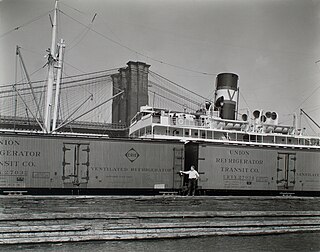
The Union Refrigerator Transit Line (URT) was a St. Louis, Missouri- and Milwaukee, Wisconsin-based private refrigerator car line established in 1895 by the Joseph Schlitz Brewing Company. In 1929, the General American Tank Car Corporation acquired the URT and placed its rolling stock into lease service. In the early 1970s the company, then operating as the General American Transportation Corporation (GATX) liquidated its URT subsidiary along with its outdated wooden reefer fleet.
The North Western Refrigerator Line (NWX) was a Chicago, Illinois-based private refrigerator car line established in 1924, one of the last such companies to be formed. Between 1924 and 1940 the company acquired more than 3,000 new wood refrigerator cars originally built by the American Car and Foundry Company, and leased the former Ringling Brothers Circus railroad car plant in Baraboo, Wisconsin to serve as a car shop.
















